Is Hacktivism Morally Justified or Virtual Vigilantism Debate?
VerifiedAdded on 2023/06/12
|6
|1835
|194
Presentation
AI Summary
This presentation delves into the complex question of whether hacktivism is morally justified or merely virtual vigilantism. It begins by defining hacktivism and highlighting its controversial nature, exploring examples like WikiLeaks and Anonymous. The presentation discusses arguments for and against hacktivism, examining its potential to promote civil rights and expose governmental misconduct while also acknowledging its potential for illegal activities and cyber terrorism. It also touches upon the role of cyber activists in protecting the internet and upholding human rights, referencing international covenants and the impact of groups like WikiLeaks. The presentation concludes by emphasizing the mixed nature of hacktivism, acknowledging both its potential benefits and risks to society.
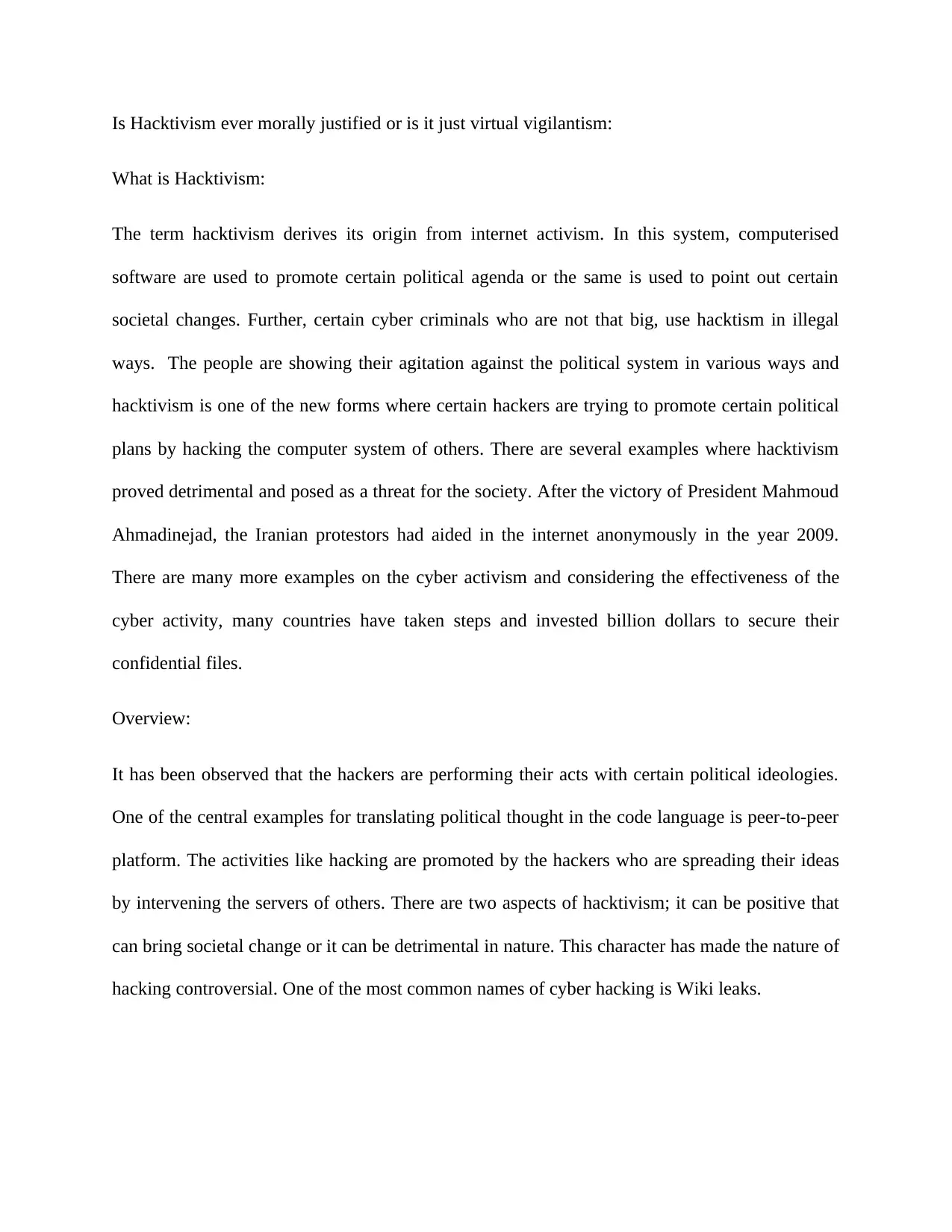
Is Hacktivism ever morally justified or is it just virtual vigilantism:
What is Hacktivism:
The term hacktivism derives its origin from internet activism. In this system, computerised
software are used to promote certain political agenda or the same is used to point out certain
societal changes. Further, certain cyber criminals who are not that big, use hacktism in illegal
ways. The people are showing their agitation against the political system in various ways and
hacktivism is one of the new forms where certain hackers are trying to promote certain political
plans by hacking the computer system of others. There are several examples where hacktivism
proved detrimental and posed as a threat for the society. After the victory of President Mahmoud
Ahmadinejad, the Iranian protestors had aided in the internet anonymously in the year 2009.
There are many more examples on the cyber activism and considering the effectiveness of the
cyber activity, many countries have taken steps and invested billion dollars to secure their
confidential files.
Overview:
It has been observed that the hackers are performing their acts with certain political ideologies.
One of the central examples for translating political thought in the code language is peer-to-peer
platform. The activities like hacking are promoted by the hackers who are spreading their ideas
by intervening the servers of others. There are two aspects of hacktivism; it can be positive that
can bring societal change or it can be detrimental in nature. This character has made the nature of
hacking controversial. One of the most common names of cyber hacking is Wiki leaks.
What is Hacktivism:
The term hacktivism derives its origin from internet activism. In this system, computerised
software are used to promote certain political agenda or the same is used to point out certain
societal changes. Further, certain cyber criminals who are not that big, use hacktism in illegal
ways. The people are showing their agitation against the political system in various ways and
hacktivism is one of the new forms where certain hackers are trying to promote certain political
plans by hacking the computer system of others. There are several examples where hacktivism
proved detrimental and posed as a threat for the society. After the victory of President Mahmoud
Ahmadinejad, the Iranian protestors had aided in the internet anonymously in the year 2009.
There are many more examples on the cyber activism and considering the effectiveness of the
cyber activity, many countries have taken steps and invested billion dollars to secure their
confidential files.
Overview:
It has been observed that the hackers are performing their acts with certain political ideologies.
One of the central examples for translating political thought in the code language is peer-to-peer
platform. The activities like hacking are promoted by the hackers who are spreading their ideas
by intervening the servers of others. There are two aspects of hacktivism; it can be positive that
can bring societal change or it can be detrimental in nature. This character has made the nature of
hacking controversial. One of the most common names of cyber hacking is Wiki leaks.
Paraphrase This Document
Need a fresh take? Get an instant paraphrase of this document with our AI Paraphraser
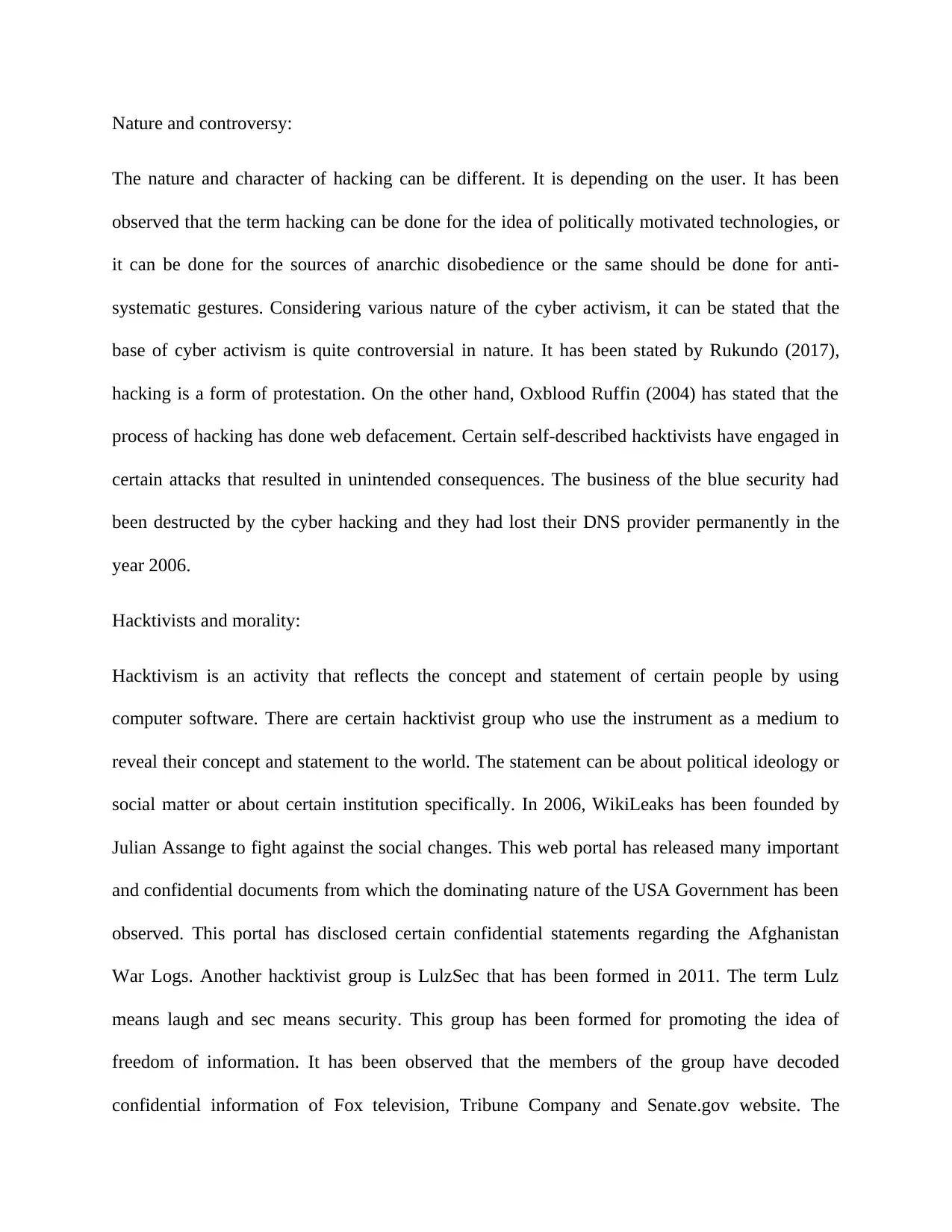
Nature and controversy:
The nature and character of hacking can be different. It is depending on the user. It has been
observed that the term hacking can be done for the idea of politically motivated technologies, or
it can be done for the sources of anarchic disobedience or the same should be done for anti-
systematic gestures. Considering various nature of the cyber activism, it can be stated that the
base of cyber activism is quite controversial in nature. It has been stated by Rukundo (2017),
hacking is a form of protestation. On the other hand, Oxblood Ruffin (2004) has stated that the
process of hacking has done web defacement. Certain self-described hacktivists have engaged in
certain attacks that resulted in unintended consequences. The business of the blue security had
been destructed by the cyber hacking and they had lost their DNS provider permanently in the
year 2006.
Hacktivists and morality:
Hacktivism is an activity that reflects the concept and statement of certain people by using
computer software. There are certain hacktivist group who use the instrument as a medium to
reveal their concept and statement to the world. The statement can be about political ideology or
social matter or about certain institution specifically. In 2006, WikiLeaks has been founded by
Julian Assange to fight against the social changes. This web portal has released many important
and confidential documents from which the dominating nature of the USA Government has been
observed. This portal has disclosed certain confidential statements regarding the Afghanistan
War Logs. Another hacktivist group is LulzSec that has been formed in 2011. The term Lulz
means laugh and sec means security. This group has been formed for promoting the idea of
freedom of information. It has been observed that the members of the group have decoded
confidential information of Fox television, Tribune Company and Senate.gov website. The
The nature and character of hacking can be different. It is depending on the user. It has been
observed that the term hacking can be done for the idea of politically motivated technologies, or
it can be done for the sources of anarchic disobedience or the same should be done for anti-
systematic gestures. Considering various nature of the cyber activism, it can be stated that the
base of cyber activism is quite controversial in nature. It has been stated by Rukundo (2017),
hacking is a form of protestation. On the other hand, Oxblood Ruffin (2004) has stated that the
process of hacking has done web defacement. Certain self-described hacktivists have engaged in
certain attacks that resulted in unintended consequences. The business of the blue security had
been destructed by the cyber hacking and they had lost their DNS provider permanently in the
year 2006.
Hacktivists and morality:
Hacktivism is an activity that reflects the concept and statement of certain people by using
computer software. There are certain hacktivist group who use the instrument as a medium to
reveal their concept and statement to the world. The statement can be about political ideology or
social matter or about certain institution specifically. In 2006, WikiLeaks has been founded by
Julian Assange to fight against the social changes. This web portal has released many important
and confidential documents from which the dominating nature of the USA Government has been
observed. This portal has disclosed certain confidential statements regarding the Afghanistan
War Logs. Another hacktivist group is LulzSec that has been formed in 2011. The term Lulz
means laugh and sec means security. This group has been formed for promoting the idea of
freedom of information. It has been observed that the members of the group have decoded
confidential information of Fox television, Tribune Company and Senate.gov website. The
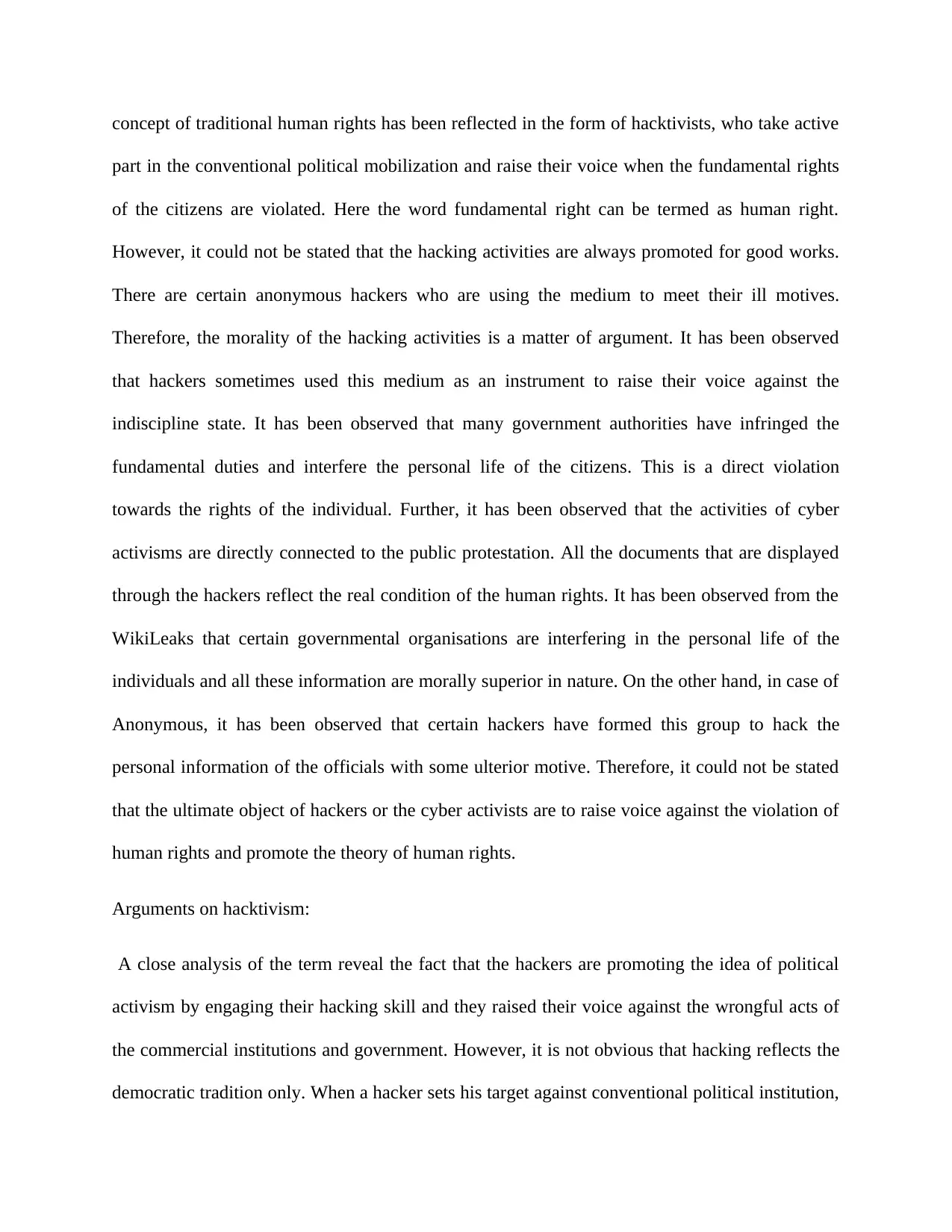
concept of traditional human rights has been reflected in the form of hacktivists, who take active
part in the conventional political mobilization and raise their voice when the fundamental rights
of the citizens are violated. Here the word fundamental right can be termed as human right.
However, it could not be stated that the hacking activities are always promoted for good works.
There are certain anonymous hackers who are using the medium to meet their ill motives.
Therefore, the morality of the hacking activities is a matter of argument. It has been observed
that hackers sometimes used this medium as an instrument to raise their voice against the
indiscipline state. It has been observed that many government authorities have infringed the
fundamental duties and interfere the personal life of the citizens. This is a direct violation
towards the rights of the individual. Further, it has been observed that the activities of cyber
activisms are directly connected to the public protestation. All the documents that are displayed
through the hackers reflect the real condition of the human rights. It has been observed from the
WikiLeaks that certain governmental organisations are interfering in the personal life of the
individuals and all these information are morally superior in nature. On the other hand, in case of
Anonymous, it has been observed that certain hackers have formed this group to hack the
personal information of the officials with some ulterior motive. Therefore, it could not be stated
that the ultimate object of hackers or the cyber activists are to raise voice against the violation of
human rights and promote the theory of human rights.
Arguments on hacktivism:
A close analysis of the term reveal the fact that the hackers are promoting the idea of political
activism by engaging their hacking skill and they raised their voice against the wrongful acts of
the commercial institutions and government. However, it is not obvious that hacking reflects the
democratic tradition only. When a hacker sets his target against conventional political institution,
part in the conventional political mobilization and raise their voice when the fundamental rights
of the citizens are violated. Here the word fundamental right can be termed as human right.
However, it could not be stated that the hacking activities are always promoted for good works.
There are certain anonymous hackers who are using the medium to meet their ill motives.
Therefore, the morality of the hacking activities is a matter of argument. It has been observed
that hackers sometimes used this medium as an instrument to raise their voice against the
indiscipline state. It has been observed that many government authorities have infringed the
fundamental duties and interfere the personal life of the citizens. This is a direct violation
towards the rights of the individual. Further, it has been observed that the activities of cyber
activisms are directly connected to the public protestation. All the documents that are displayed
through the hackers reflect the real condition of the human rights. It has been observed from the
WikiLeaks that certain governmental organisations are interfering in the personal life of the
individuals and all these information are morally superior in nature. On the other hand, in case of
Anonymous, it has been observed that certain hackers have formed this group to hack the
personal information of the officials with some ulterior motive. Therefore, it could not be stated
that the ultimate object of hackers or the cyber activists are to raise voice against the violation of
human rights and promote the theory of human rights.
Arguments on hacktivism:
A close analysis of the term reveal the fact that the hackers are promoting the idea of political
activism by engaging their hacking skill and they raised their voice against the wrongful acts of
the commercial institutions and government. However, it is not obvious that hacking reflects the
democratic tradition only. When a hacker sets his target against conventional political institution,
⊘ This is a preview!⊘
Do you want full access?
Subscribe today to unlock all pages.

Trusted by 1+ million students worldwide
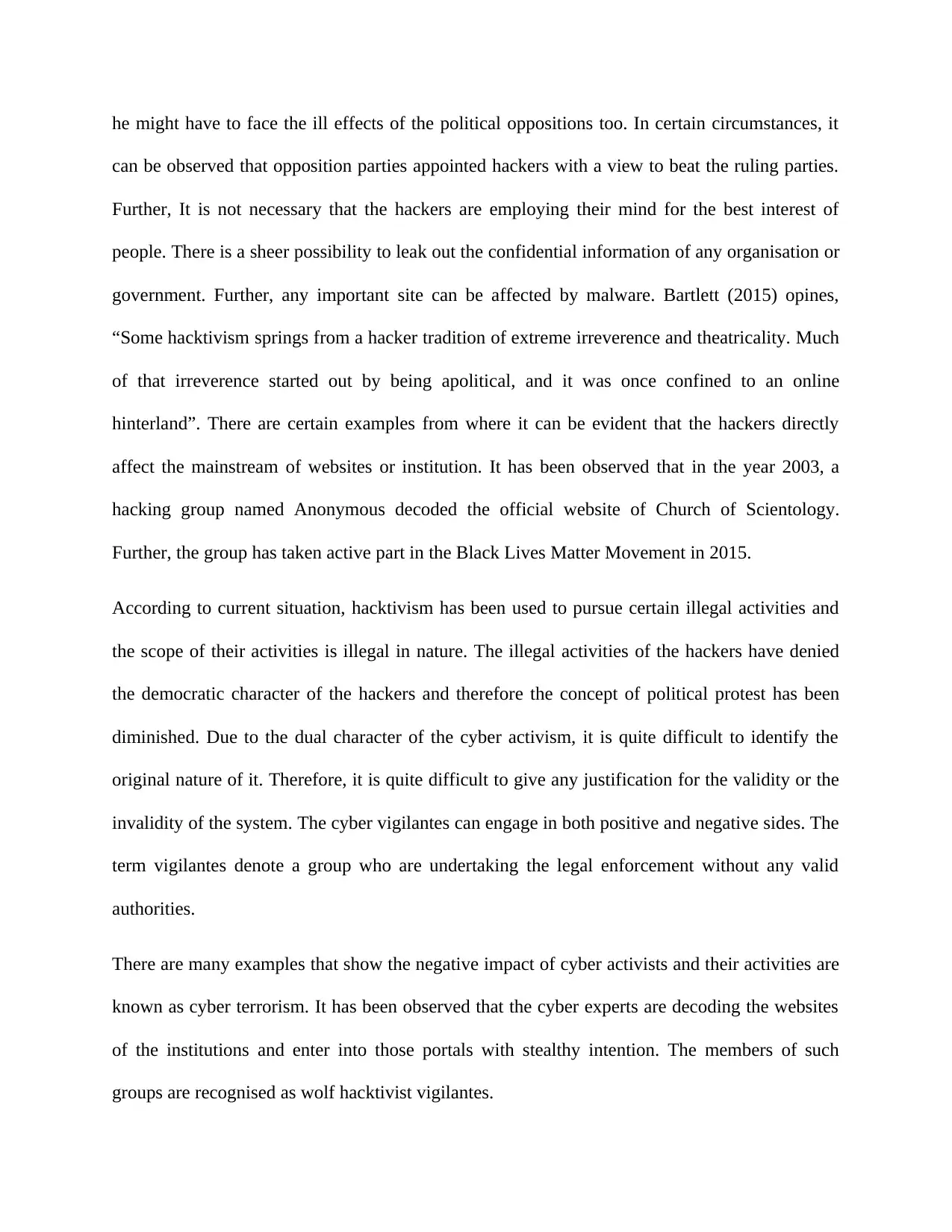
he might have to face the ill effects of the political oppositions too. In certain circumstances, it
can be observed that opposition parties appointed hackers with a view to beat the ruling parties.
Further, It is not necessary that the hackers are employing their mind for the best interest of
people. There is a sheer possibility to leak out the confidential information of any organisation or
government. Further, any important site can be affected by malware. Bartlett (2015) opines,
“Some hacktivism springs from a hacker tradition of extreme irreverence and theatricality. Much
of that irreverence started out by being apolitical, and it was once confined to an online
hinterland”. There are certain examples from where it can be evident that the hackers directly
affect the mainstream of websites or institution. It has been observed that in the year 2003, a
hacking group named Anonymous decoded the official website of Church of Scientology.
Further, the group has taken active part in the Black Lives Matter Movement in 2015.
According to current situation, hacktivism has been used to pursue certain illegal activities and
the scope of their activities is illegal in nature. The illegal activities of the hackers have denied
the democratic character of the hackers and therefore the concept of political protest has been
diminished. Due to the dual character of the cyber activism, it is quite difficult to identify the
original nature of it. Therefore, it is quite difficult to give any justification for the validity or the
invalidity of the system. The cyber vigilantes can engage in both positive and negative sides. The
term vigilantes denote a group who are undertaking the legal enforcement without any valid
authorities.
There are many examples that show the negative impact of cyber activists and their activities are
known as cyber terrorism. It has been observed that the cyber experts are decoding the websites
of the institutions and enter into those portals with stealthy intention. The members of such
groups are recognised as wolf hacktivist vigilantes.
can be observed that opposition parties appointed hackers with a view to beat the ruling parties.
Further, It is not necessary that the hackers are employing their mind for the best interest of
people. There is a sheer possibility to leak out the confidential information of any organisation or
government. Further, any important site can be affected by malware. Bartlett (2015) opines,
“Some hacktivism springs from a hacker tradition of extreme irreverence and theatricality. Much
of that irreverence started out by being apolitical, and it was once confined to an online
hinterland”. There are certain examples from where it can be evident that the hackers directly
affect the mainstream of websites or institution. It has been observed that in the year 2003, a
hacking group named Anonymous decoded the official website of Church of Scientology.
Further, the group has taken active part in the Black Lives Matter Movement in 2015.
According to current situation, hacktivism has been used to pursue certain illegal activities and
the scope of their activities is illegal in nature. The illegal activities of the hackers have denied
the democratic character of the hackers and therefore the concept of political protest has been
diminished. Due to the dual character of the cyber activism, it is quite difficult to identify the
original nature of it. Therefore, it is quite difficult to give any justification for the validity or the
invalidity of the system. The cyber vigilantes can engage in both positive and negative sides. The
term vigilantes denote a group who are undertaking the legal enforcement without any valid
authorities.
There are many examples that show the negative impact of cyber activists and their activities are
known as cyber terrorism. It has been observed that the cyber experts are decoding the websites
of the institutions and enter into those portals with stealthy intention. The members of such
groups are recognised as wolf hacktivist vigilantes.
Paraphrase This Document
Need a fresh take? Get an instant paraphrase of this document with our AI Paraphraser
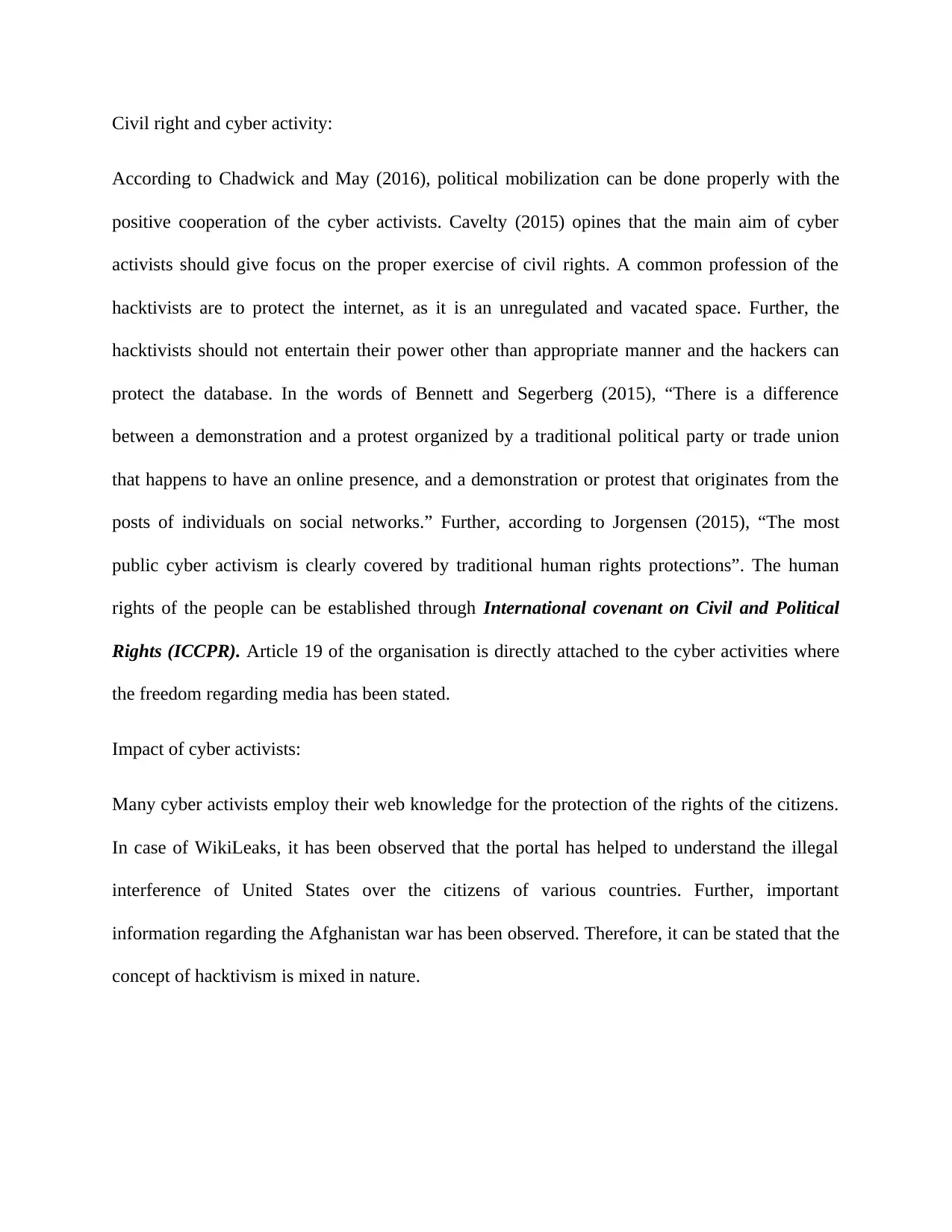
Civil right and cyber activity:
According to Chadwick and May (2016), political mobilization can be done properly with the
positive cooperation of the cyber activists. Cavelty (2015) opines that the main aim of cyber
activists should give focus on the proper exercise of civil rights. A common profession of the
hacktivists are to protect the internet, as it is an unregulated and vacated space. Further, the
hacktivists should not entertain their power other than appropriate manner and the hackers can
protect the database. In the words of Bennett and Segerberg (2015), “There is a difference
between a demonstration and a protest organized by a traditional political party or trade union
that happens to have an online presence, and a demonstration or protest that originates from the
posts of individuals on social networks.” Further, according to Jorgensen (2015), “The most
public cyber activism is clearly covered by traditional human rights protections”. The human
rights of the people can be established through International covenant on Civil and Political
Rights (ICCPR). Article 19 of the organisation is directly attached to the cyber activities where
the freedom regarding media has been stated.
Impact of cyber activists:
Many cyber activists employ their web knowledge for the protection of the rights of the citizens.
In case of WikiLeaks, it has been observed that the portal has helped to understand the illegal
interference of United States over the citizens of various countries. Further, important
information regarding the Afghanistan war has been observed. Therefore, it can be stated that the
concept of hacktivism is mixed in nature.
According to Chadwick and May (2016), political mobilization can be done properly with the
positive cooperation of the cyber activists. Cavelty (2015) opines that the main aim of cyber
activists should give focus on the proper exercise of civil rights. A common profession of the
hacktivists are to protect the internet, as it is an unregulated and vacated space. Further, the
hacktivists should not entertain their power other than appropriate manner and the hackers can
protect the database. In the words of Bennett and Segerberg (2015), “There is a difference
between a demonstration and a protest organized by a traditional political party or trade union
that happens to have an online presence, and a demonstration or protest that originates from the
posts of individuals on social networks.” Further, according to Jorgensen (2015), “The most
public cyber activism is clearly covered by traditional human rights protections”. The human
rights of the people can be established through International covenant on Civil and Political
Rights (ICCPR). Article 19 of the organisation is directly attached to the cyber activities where
the freedom regarding media has been stated.
Impact of cyber activists:
Many cyber activists employ their web knowledge for the protection of the rights of the citizens.
In case of WikiLeaks, it has been observed that the portal has helped to understand the illegal
interference of United States over the citizens of various countries. Further, important
information regarding the Afghanistan war has been observed. Therefore, it can be stated that the
concept of hacktivism is mixed in nature.
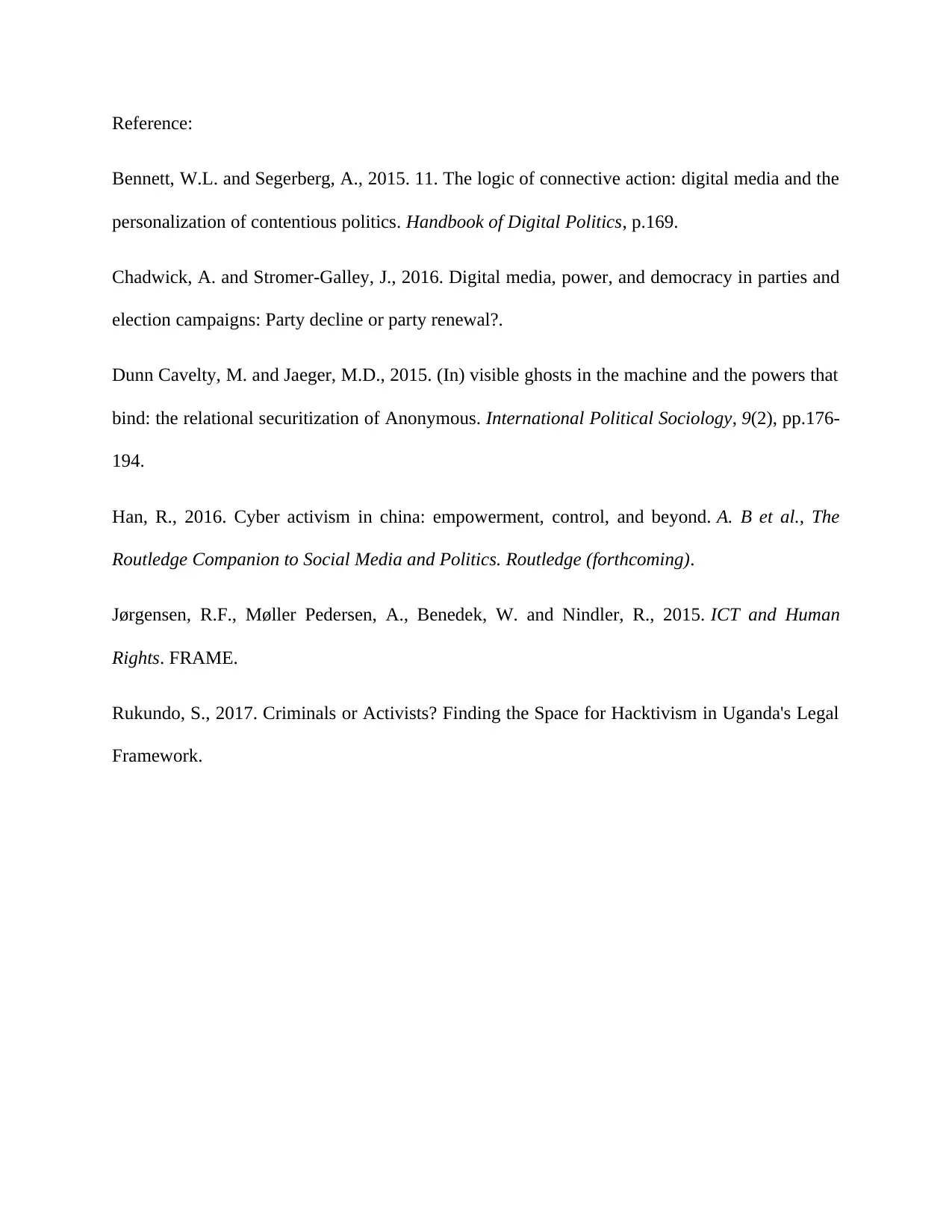
Reference:
Bennett, W.L. and Segerberg, A., 2015. 11. The logic of connective action: digital media and the
personalization of contentious politics. Handbook of Digital Politics, p.169.
Chadwick, A. and Stromer-Galley, J., 2016. Digital media, power, and democracy in parties and
election campaigns: Party decline or party renewal?.
Dunn Cavelty, M. and Jaeger, M.D., 2015. (In) visible ghosts in the machine and the powers that
bind: the relational securitization of Anonymous. International Political Sociology, 9(2), pp.176-
194.
Han, R., 2016. Cyber activism in china: empowerment, control, and beyond. A. B et al., The
Routledge Companion to Social Media and Politics. Routledge (forthcoming).
Jørgensen, R.F., Møller Pedersen, A., Benedek, W. and Nindler, R., 2015. ICT and Human
Rights. FRAME.
Rukundo, S., 2017. Criminals or Activists? Finding the Space for Hacktivism in Uganda's Legal
Framework.
Bennett, W.L. and Segerberg, A., 2015. 11. The logic of connective action: digital media and the
personalization of contentious politics. Handbook of Digital Politics, p.169.
Chadwick, A. and Stromer-Galley, J., 2016. Digital media, power, and democracy in parties and
election campaigns: Party decline or party renewal?.
Dunn Cavelty, M. and Jaeger, M.D., 2015. (In) visible ghosts in the machine and the powers that
bind: the relational securitization of Anonymous. International Political Sociology, 9(2), pp.176-
194.
Han, R., 2016. Cyber activism in china: empowerment, control, and beyond. A. B et al., The
Routledge Companion to Social Media and Politics. Routledge (forthcoming).
Jørgensen, R.F., Møller Pedersen, A., Benedek, W. and Nindler, R., 2015. ICT and Human
Rights. FRAME.
Rukundo, S., 2017. Criminals or Activists? Finding the Space for Hacktivism in Uganda's Legal
Framework.
⊘ This is a preview!⊘
Do you want full access?
Subscribe today to unlock all pages.

Trusted by 1+ million students worldwide
1 out of 6
Your All-in-One AI-Powered Toolkit for Academic Success.
+13062052269
info@desklib.com
Available 24*7 on WhatsApp / Email
![[object Object]](/_next/static/media/star-bottom.7253800d.svg)
Unlock your academic potential
Copyright © 2020–2026 A2Z Services. All Rights Reserved. Developed and managed by ZUCOL.

